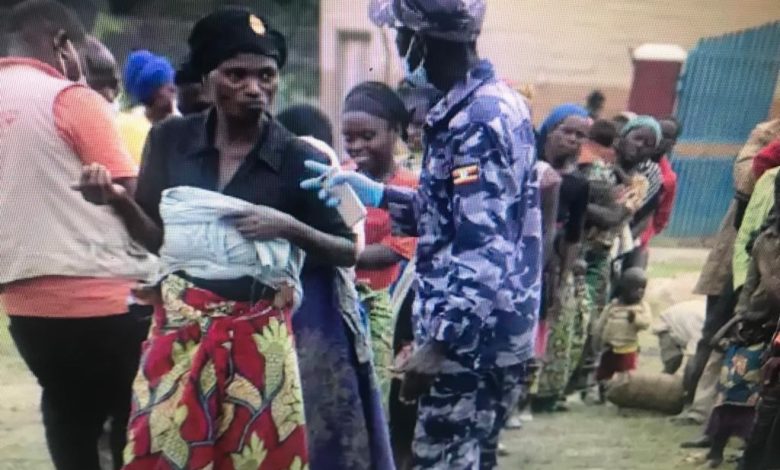DR Congo, Ugandan Joint Offensives Free 27 Persons Held By ADF Rebels
The FARDC has announced that 27 persons held by Allied Democratic Forces (ADF) rebels in eastern DR Congo escaped from captivity on Tuesday, Nov. 30, following bombardments by joint forces in eastern Congo on ADF positions.

The Democratic Republic of Congo army, FARDC, has announced that 27 persons held by Allied Democratic Forces (ADF) rebels in eastern DR Congo escaped from captivity on Tuesday, Nov. 30, following bombardments by joint forces in eastern Congo on ADF positions.
The bombardments marked the launch of the joint operations by DR Congo and Ugandan forces against the ADF rebels.
The Ugandan Ministry of Defense revealed that the joint operation launched last Tuesday is condemned “Shujja” (Swahili for ‘the strong one’) and was aimed at four sites identified as ADF bases in eastern DR Congo.
“The operations in Beni territory of North Kivu enabled 27 citizens kidnapped by the ADF to escape from their captors,” said Lt. Anthony Mwalushayi, spokesperson of the FARDC in the zone who published a photo of the former hostages held in a camp about 10 kilometres from Beni.
“At about 3 a.m. in the morning, a drone passed above us,” one of the former hostages who identified himself as Paluku Makombozi told the DR Congo army radio, FARDC-FM, adding that “the ADF told us to put out our fires and around 6 a.m. we heard bombs, boom, boom.”
“I heard one of the ADF rebels tell one of his chiefs ‘it is Museveni who is bombing us’ after which we dispersed with glory to God. We were lucky to find our way right to the military camp,” Makombozi, who said he is a farmer in Komanda in neighbouring Ituri province, declared, adding that he was in his farm when the ADF kidnapped him.
Selemani Hassan, a Tanzanian driver, explained that he was taken hostage on Nov. 5, 2021 on the Komanda road.
“I heard gunshots and men shouting ‘Allah akbar’ and they took me along with other hostages into the bushes. They tried to convince us to convert to Islam,” Hassan revealed.
“When Uganda launched the operation against the ADF, we heard gunfire and then we saw drones, then the bombardments started. The ADF rebels dispersed in panic and so I had to escape.”
Another hostage, Josephine Mateso, revealed that she had spent two and a half months in the bushes with the ADF.
“I was in a camp for women and the ADF chief there told us their wish was that all the whole world become Muslim. They were using us to work on their farms,” Mateso said.
The joint military operations launched on Tuesday eastern DR Congo continue with search and destroy missions.
An eyewitness at the Nobili border post in North Kivu on Friday, Dec. 3, said he had seen a fourth column of Ugandan troops cross the border within four days with trucks and light tanks, heading towards their advance base in the village of Mukakati.
The Ugandan military has revealed on its website that it has deployed infantry, artillery, tanks, and special forces for the operation, adding that forces are commanded by General Kayanja Muhanga.
“They [Ugandan forces] will be principally employed to weaken enemy camps identified in Yayuwa, Tondoli, Beni 1 and Beni 2,” the Ugandan army said.
General Muhanga said the operations would be strategically evaluated every two months but he could not give any information concerning the operations so far though the Ugandan army website makes allusion to “thousands of victims among the ADF.”
However, Amnesty International has called on all parties to “ensure the protection of civilians and to respect international humanitarian law”.
“In the past, foreign military interventions, including by Ugandans, have in the end targeted civilians,” Sarah Jackson, Assistant Regional Director of Amnesty International, said in a communique.
Support Our Journalism
There are millions of ordinary people affected by conflict in Africa whose stories are missing in the mainstream media. HumAngle is determined to tell those challenging and under-reported stories, hoping that the people impacted by these conflicts will find the safety and security they deserve.
To ensure that we continue to provide public service coverage, we have a small favour to ask you. We want you to be part of our journalistic endeavour by contributing a token to us.
Your donation will further promote a robust, free, and independent media.
Donate HereStay Closer To The Stories That Matter




